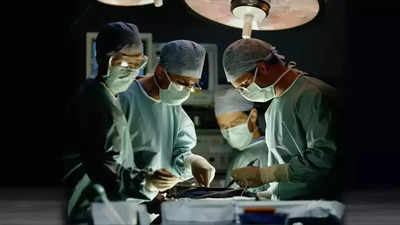NEW DELHI: A private healthcare facility in New Delhi successfully performed a kidney auto-transplant on a 6-year-old Uzbek child diagnosed with bilateral Wilms tumour, a rare form of kidney cancer affecting children.
The critically ill patient, whose kidneys were both affected by tumours, was brought to India after unsuccessful chemotherapy in Uzbekistan.
The child received treatment at Fortis Escorts, Okhla, where Dr Paresh Jain and his team performed an eight-hour surgery, resulting in a swift recovery.
Doctors said that medical assessment revealed tumours in both kidneys, with severe cancer involvement in the left kidney and affected lymph nodes. In August 2024, the surgical team performed a laparoscopic right partial nephrectomy, removed enlarged lymph nodes, and conducted a left kidney biopsy.
The patient underwent chemotherapy in Uzbekistan before returning to Fortis Escorts Okhla in November. While PET-CT scans showed a cancer-free right kidney, the left kidney still had a smaller tumour.
The second surgery proved challenging due to dense tissue formation from previous treatments.
The surgical team removed the kidney through a small lower abdominal incision, removed the tumour, reconstructed blood vessels and urinary pathways, before reimplanting the cancer-free kidney in the lower abdomen. The patient recovered without complications.
Wilms’ tumour accounts for 6% of childhood malignancies globally, with bilateral cases representing 5-7% of all instances.
Dr Jain stated, “This achievement is especially noteworthy, as only 16 similar cases have been documented worldwide, with none reported previously in India. Wilms tumour, usually diagnosed in children aged 3-4 years, presents significant challenges due to its rarity and complexity. Its advanced stage poses a unique challenge because it can be bilateral, affecting both the kidneys, and if not treated promptly, it can become life-threatening.”
He emphasised the key importance of this surgical intervention in preventing maternal kidney donation. The operation safeguarded the mother’s wellbeing by retaining her kidney function. Additionally, it removed the necessity for continuous immunosuppressive medication, which is typically mandatory post-transplant.
This approach prevented potential adverse effects, reduced infection susceptibility and lessened the financial impact.
Dr Jain noted that considering the patient’s early age, approximately three kidney transplants would be necessary throughout his life.
The successful surgery maintained his original kidney functionality, thus eliminating the requirement for repeated transplant procedures.
link
